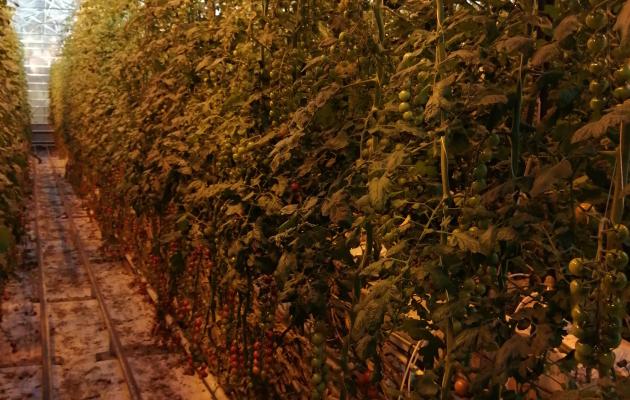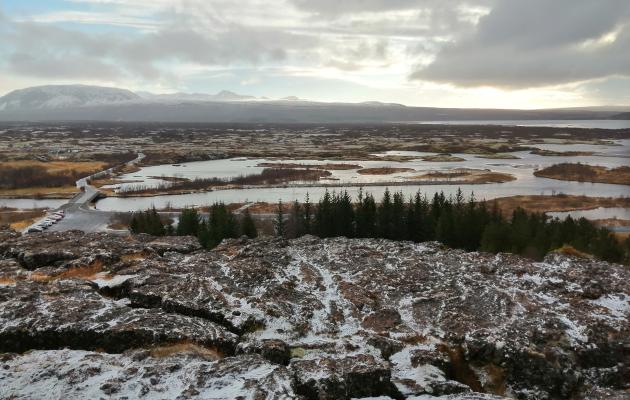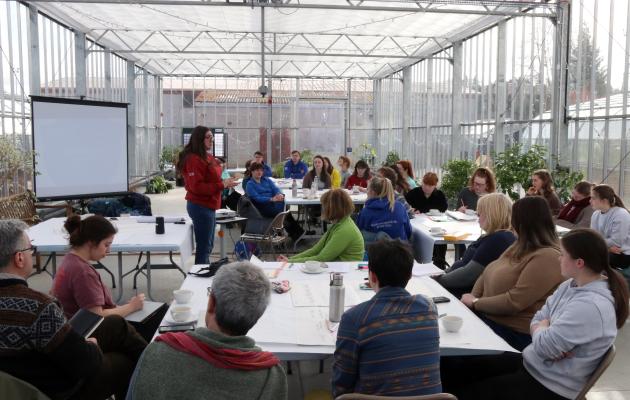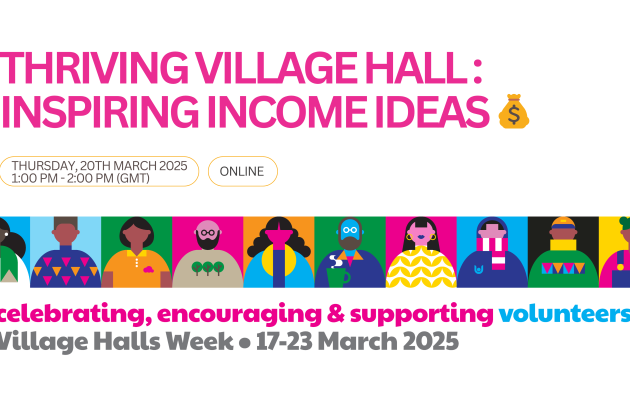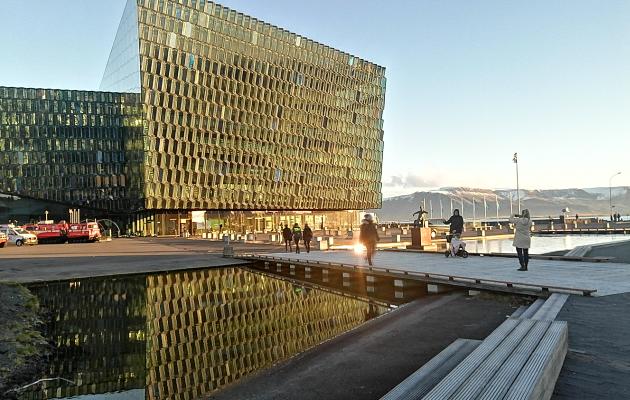
There were representatives from all sectors of life from the Arctic Circle, with Scotland being the most northerly non-Arctic country. I live in the Isle of Grimsay (Griomasaigh) in Uist, Outer Hebrides, and there is also a Grimsey Island in Iceland, so we're closer than at first thought in some ways!
It was encouraging to see that indigenous peoples could be heard in a range of sessions. However, one person said, 'we do not lack technical innovation in the Arctic but we lack business and political innovation'. H.E. Rt Hon. Mary Simon, Governor General of Canada (who was indigenous) said, 'A sign of hope is being able to speak in your own indigenous language.'
I attended a plenary session hosted by the Americans: The Future of Arctic Peace, Science and Security. They summarised their new strategy in which they spoke about prosperity, sustainable growth etc. Of course, security is a big driver because 'their' Arctic is across the water from 'the Russian Arctic'. Always growth... just mitigating the how. After the presentation, I said I hadn't read their new strategy but hoped that it was with a good heart; however, I asked whether we should be considering new ways of living instead of a continual extraction model to prop up societies far removed from the Arctic. Shouldn't we be considering some degrowth ideas? There was a big round of applause, and then a group of indigenous people came and hugged me.
The response from the stage was that it was ok for those of us who have what we need to take that position, but he thought indigenous peoples would want roads and hospitals etc. The following day the Inuit gave me a book explaining how mitigating strategies like pumping CO2 into defunct oil wells is not having a good impact on climate responses locally.
We also heard that Arctic people have the insights but not the voice or governance. Local groups can respond but don't have influence, but if a cause is taken up by national or international organisations, it can be debated year after year with no action in the end. Models lack the space for justice and equity.
Iceland only gained its independence in 1944. They have a population of 360,000. Fish, mainly Cod, is the number one sector, followed by tourism.
Some of the most insightful sessions I attended were led by indigenous people from across the Arctic. The session was called indigenous knowledge and cosmovision in climate mitigation.
Some of the quotes I noted were, 'Our language roots us with our traditions '(Inuit). English phrases such as 'traditional ecological knowledge puts us in a box'. 'If we were to leave this earth (as humans) Mother Earth would heal herself; the animals would remain'. They regard themselves as a land-based people whose knowledge is shared.
At another session, A 'Just' Energy Transition in the Arctic, indigenous leader and Senior Regional Director of Alaska said, 'be careful what you wish for'... Tesla is rolling out cars as a green fueled alternative for cars, but this has resulted in the destruction of a mountain in their territory being mined for minerals needed for the electric cars.
I presented at the session: Remote Areas: A window of opportunity with colleagues from the Faroe Islands and Iceland. We all presented positive examples of turn around in the communities in which we work. We were invited by NORA https://nora.fo/?_l=en
Our host and facilitator reported that after our session he received the following message: 'Just a short thank you for your time at our session. I think you all can be very proud. I have never before got so many positive feedback before.'
We also received a lovely message from another guest there. For me, I was overwhelmed by the positive response and in summary, although there are challenges, it was so encouraging to realise that between my previous work of linking education curriculum with economic opportunity with industry standard qualifications, the 'economic literacy workshops' which Thomas and I developed and delivered, and now Uist Beò. I showed statements from the usual tourism messages and images of an empty beach and a roofless cottage to a soundtrack used for promoting Scotland and compared it to Uist Beò , the Instagram feed and a Tiktok clip.
I also presented on a session called: Polar Law: The Just Transition to Low Carbon Economies in the Arctic and Beyond. I spoke about food and global movement of 'products' around the world. Rosie MacLeod who was with me from Raasay Development Trust presented her work on the new hydropower in Raasay. SSE had given £350k towards the scheme, but 3 local young people on the board of Raasay Development Trust issued a Community Share Offer which raised a further £650k in 7 weeks! They aim to sell the electricity locally, with profits going into a community benefit scheme which they will use to refit old houses - brilliant! Oh, that we could do that in Uist!
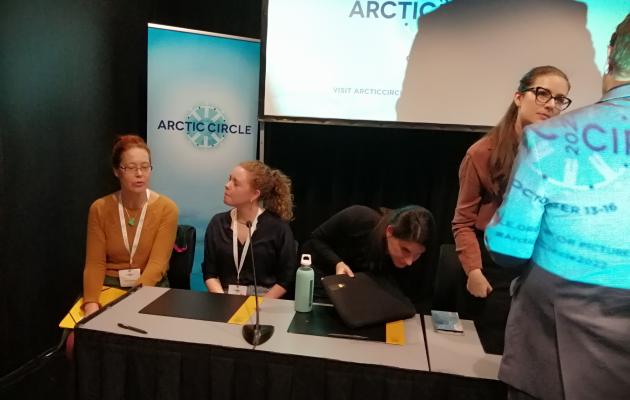
Rosie Macleod, Raasay Development Trust, second on the left
This was the feed back from Rachael Lorna Johnstone Prófessor / Professor Hug- og félagsvísindasvið / School of Humanities and Social Sciences:
Dear friends,
I wanted to thank you for a very successful (in my humble view) session on the Just Transition at ACA. We had a great turnout and good feedback on the session. To my delight, Aili Keskitalo, former president of the Saami Parliament in Norwegian Sápmi, came up and thanked us for the session and was very positive about it! If we have her approval, I do not need anyone else’s!
Let’s keep fighting the good fight!
Rachael
On the last day, we were able to get out of the conference centre and see a little of Iceland. We visited a tomato farm: hydroponics and, of course, heated by geothermal energy. It produces 40% of Iceland's tomatoes, and one other farm produces another 30%, so they do not export because they still have to import. We also visited the National Park where the first National Parliament was held by the Vikings, not regional assemblies, but countrywide. There were no indigenous people in Iceland, the Vikings from Norway were first, arriving via Ireland, so their genetic mix on the male line is Norwegian and Irish on the female line.
Two words in common usage came from Iceland: Saga and Geyser.
